Search results for :
Weekend Professional MBA
University of Florida Hough Weekend Professional MBA Program Structure
Like the University of Florida Hough Graduate School of Business full-time MBA program, the Weekend Professional MBA program can be completed in multiple formats: an accelerated One-Year program; a Two-Year program; and a Two-Year program in South Florida at the UF MBA Sunrise Center on Sawgrass Corporate Parkway. Other than location, the major difference between the two versions of the Two-Year offerings is the time to complete the program. The South Florida version takes 24 months, and the standard version takes 27 months.
Classes are only held on a weekend schedule, in contrast to the weekday schedule of the full-time program. The One-Year program is specifically designed for applicants that earned an undergraduate business degree in the previous seven years and have two years of work experience. The Two-Year program is advised for applicants that have been out of school for a small amount of time and do not have an undergraduate business degree.
The Two-Year Weekend Professional MBA program requires 48 credits to complete, and the One-Year program requires 32 credits.
Curriculum
The Two-Year Weekend Professional MBA program offers four specialized areas of concentration: entrepreneurship; finance; global business; and marketing. The 48-credit program is split between seven separate terms, each of which features one-to-three courses, in addition to experiential learning offerings.
The compressed 32-credit One-Year format features less core courses, designed for students with an business degree that already completed similar coursework as undergraduates. Beginning in the spring semester, the One-Year format features four total terms, plus experiential learning offerings.
Part-Time MBA Rankings
• U.S. News & World Report: 32 (tie)
Class Profile
The average age of the Two-Year Weekend Professional MBA program is 27. Enrolled students have about 6.5 years of previous work experience, an average GMAT score of 546, a GRE of 304, and a GPA of 3.25.
The average age of students in the One-Year format is 29. Students in the program have around five years of previous work experience, a GMAT of 556, a GRE of 306, and an undergraduate GPA of 3.38.
Tuition, Scholarships, and Financial Aid
Tuition and fees for the Two-Year University of Florida Hough Weekend Professional MBA program is $59,807.52. The One-Year program costs $49,204.80. Included in the costs is a non-refundable deposit of $1,500 required to hold a spot in the program.
Most students in the program enroll with federal financial aid. However, private loan options are available and may be a requirement for international applicants. Head over the Office for Student Financial Affairs page to learn more.
Admissions at the Florida Hough Weekend Professional MBA
To apply to any of the University of Florida Hough Weekend Professional MBA programs, an online registration form must be completed prior to the official application. After that is completed and accepted, the school asks for a UF MBA Supplemental Application, which features select essay questions that should only be one page long.
Applicants must have an accredited bachelor’s degree from a U.S. school, or equivalent, in addition to two years of previous work experience.
In addition, the following must be submitted:
• Official transcripts
• A résumé
• Two letters of recommendation
• GMAT/GRE scores
International applicants must submit immigration documentations and a Certificate of Financial Responsibility. In addition, those who earned an undergraduate degree from a non-native English speaking country or academic institution may have to take an English proficiency test. These can include the TOEFL, IELTS, or the MELAB (Michigan English Language Assessment Battery).
Application deadlines are as follows:
| Admission Term | Apply By | Orientation | Classes Start |
|---|---|---|---|
| Spring | Dec 1, 2021 | Jan 7 -8, 2022 | Jan 9, 2022 |
New Pharmaceutical MBA Jobs That Will Catch Your Attention
Any time you’re making a run to your local CVS, Duane Reade, Wallgreens or Rite Aid, you’re surrounded by a cornucopia of consumer goods. From soaps to over the counter medicines, cleaning products to make-up, there’s no shortage of stuff you can conveniently buy. As such, there’s also no shortage of new MBA jobs at the companies who manufacture and distribute the goods. Here’s a selection of new pharmaceutical MBA jobs at companies you should remember. Continue reading…
Full-Time MBA
University of Florida Hough Full-Time MBA Program Structure
The University of Florida Hough Graduate School of Business at the Warrington College of Business offers three variations of its AACSB-accredited full-time MBA program: a Two-Year, traditional style full-time MBA; a One-Year MBA for all majors; and a 10-month MBA built for business majors.
The Two-Year path features 12 core courses and three electives in the first year, split between four separate modules. These modules usually feature three or four distinct courses. Students typically begin elective courses after the second module. In the second year, elective courses expand from three to six in total. In addition, there are two optional global experience offerings. These take place during the fall and spring breaks.
The One-Year All Majors accelerated path for students regardless of undergraduate major begins in the summer with the Summer A block of courses. The following year, the program culminates with the Summer B block of courses. In total, these summer blocks feature 10 of the 16 required core courses. The final required courses, plus the nine required elective courses, take place during the fall and spring. Like the Two-Year path, students can complete optional global immersion experiences during the fall and spring breaks. In total, students need 48 credits to complete the One-Year UF MBA.
The One-Year Business Majors program operates on a similar schedule to the full-time One-Year All Majors path, albeit with less core courses. This means that the initial summer semester only features a One Week Foundations Review.
Curriculum
The University of Florida Hough Graduate School of Business full-time MBA program offers over 100 elective course options, crafted around six distinct concentrations: business analytics; human capital; marketing; real estate; strategy; and supply chain management.
In addition to the traditional curriculum elements, the UF MBA program features intensive leadership coursework. This covers topics such as emotional intelligence, ethical leadership, social responsibility, and more. With the expansive array of opportunities at the University of Florida, MBAs also have a litany of experiential options at their disposal, which can include management simulations and seminars, international immersion experiences, career coaching, workshops, and much more.
Full-Time MBA Rankings
U.S. News & World Report: 28
Bloomberg: 32 (US)
Financial Times: 40
The Economist: 40
Class Profile
The MBA program at the Hough Graduate School of Business has 66 percent male students and 34 percent female students. About 14 percent are international students.
The average GMAT score is 687, the undergraduate GPA mean is 3.38. The average amount of prior work experience is 4-5 years.
Career Statistics
About 90.6 percent of UF full-time MBA graduates earned employment offers within three months of graduating. The average base salary of recent grades is around $109,500 per year, with an average signing bonus of $23,400.
Tuition, Scholarships, and Financial Aid
Total tuition and fees for the University of Florida Hough full-time MBA is currently $26,473 for Florida residents and $61,260 for non-Florida residents. The One-Year Business Majors program cost is $17,982 for in-state residents and $41,173 for out-of-state residents. The One-Year All Majors program cost is $25,475 for in-state residents and $60,261 for out-of-state residents. These figures do not include the cost of living on campus, materials, travel expenses, and other miscellaneous expenses.
Scholarships covering the entire cost of the tuition and fees are offered to qualified enrolled students that have demonstrated excellent previous work experience, academic performance, leadership experience, and other notable accomplishments. Students admitted into the program are automatically considered for the scholarship.
Most students in the program enroll with federal financial aid. Private loan options are available and may be a requirement for international applicants. Head over the Office for Student Financial Affairs page to learn more.
Admissions
To apply to the University of Florida Hough full-time MBA program, an online registration form must be completed prior to the official application. After that is completed and accepted, the school asks for a UF MBA Supplemental Application, which features select essay questions that should only be one page long.
Applicants must have an accredited bachelor’s degree from a U.S. school, or equivalent. Students must also have completed two years of previous work experience.
In addition, the following must be submitted:
- Official transcripts
- A résumé
- Two letters of recommendation
- GMAT/GRE scores
International applicants must submit immigration documentations and a Certificate of Financial Responsibility. Those who earned an undergraduate degree from a non-native English speaking country or academic institution may have to take an English proficiency test. These can include the TOEFL, IELTS, or the MELAB (Michigan English Language Assessment Battery).
Application deadlines are as follows:
Required Orientation: Aug 10 – 19, 2022
First Day of Class: Aug 22
| Admission | Apply by |
|---|---|
| Round 1 | Oct 15 |
| International Applicants | Oct 15 |
| Round 2 | Jan 15 |
| Round 3 | Mar 15 |
School v. School: Vanderbilt Owen vs. Washington U. St. Louis Olin
When you have two highly competitive and comparable MBA programs on your list, which one do you choose? You have to look at everything from location to rankings, ROI, and program offerings. It’s how everything comes together that makes a program the best fit for you.
The good news is that our School v. School series is here to simplify your decision-making process with a point-by-point comparison of two stand-out programs: Vanderbilt University’s Owen Graduate School of Management and Washington University’s Olin Business School. We’ve collected everything you’ve always wanted to know about each program to see which is best for you. Continue reading…
Entrepreneurship Funding According to Harvard Business School
There’s no doubt that entrepreneurs are innovative and have a ton of grit. Unfortunately, according to Harvard Business School Assistant Professor Andy Wu, that determination and creativity doesn’t always translate into funding. Often, entrepreneurs are short-sighted when it comes to where to find funding. And while there are discussions and classes all about starting a business, there are few learning opportunities dedicated to entrepreneurship funding—financial and non-financial—to bring the idea to life.
To examine how the entrepreneurial community looks at funding, Wu along with his colleagues David R. Clough, Tommy Pan Fang, and Balagopal Vissa published a paper titled, “Turning Lead Into Gold: How Do Entrepreneurs Mobilize Resources to Exploit Opportunities?”
What they found is that too much focus is placed on raising money and signing contracts, and not enough emphasis is placed on informal and non-financial resources. And the reality is that these resources can make or break a business.
“Entrepreneurs are more successful when they can leverage non-market, non-pecuniary resources,” Wu says. “We think that is totally the wrong mindset …The challenge to raising financial capital is often related to a lack of those other resources.”
In particular, there are three areas of non-financial funding where entrepreneurs tend to come up short:
- Searching for resources outside of immediate connections
- Non-market resources
- Transferring resources through informal transactions.
1. Resources Outside of Immediate Connections
When looking for resources, it’s fine to start with the people you know, but you can’t stop there. Your network is too narrow. Instead, you need an outward-looking mindset where you search for investors and partners outside of your immediate network.
2. Non-Market Resources
The people who will help you succeed are about more than financial capital. Your network should be leveraged for advice, mentorship, in-kind donations, and more. And the good news is that financial and non-financial resources are not mutually exclusive. Non-financial motivations can encourage investment.
3. Transferring Resources Through Informal Transactions
Not everything needs to be handled with formal contracts. Less formal arrangements for transferring knowledge that rely on trust and mutual understanding are also valuable. For example, mentors don’t need a formal agreement, but should not be discounted.
Read the full article on HBS Working Knowledge.
This article has been edited and republished with permissions from its original source, Clear Admit.
GMAT Combinations: Consider The Grouping with the Slot Method
The GMAT loves to present combination questions that force people to sit next to each other, or in certain seats, and then have the test taker figure out how many different ways people not forced to be glued to possibly a very uncomfortable chair can be seated around them. Because free will, clearly, is not an option for many movie-goers, committee members, and/or people seated in a kumbaya circle.
Take this question, for example:
A group of five students bought movie tickets in one row next to each other. If Bob and Lisa are in this group, what is the probability that Bob and Lisa will each sit next to only one of the four other students from the group?
- 5 percent
- 10 percent
- 15 percent
- 20 percent
- 25 percent
See where we are going with this post?
Many test takers will immediately jump to a combination, or potentially a permutation formula (you know, because the order matters), and find themselves completely stuck on what inputs to use. Is it five? Or three? because Bob and Lisa don’t like middle seats?
The reality is that using the slot method–sketching out the seated relationship between these five people–will make it very apparent a). how much easier this problem is to tackle and b). help direct test takers more quickly to the right method of calculation rather than being mired down in trying to figure out if n!/(n-k!) works and what numbers should be used for n and k.
For this question with Bob and Lisa, and similar types of questions, try sketching out as follows:
Bob _____ _____ _____ Lisa
OR
Lisa _____ _____ _____ Bob
It looks like that there are only two different ways that Bob and Lisa can be seated, so then the focus becomes how the remaining three students can be seated. This is accomplished with a very simple factorial–3!–representing the different combinations of the remaining three students.
Alternatively, while a little more time-consuming, considering the combinations of those three movie-goers (who we can name Amy, Belinda, and Carl) is another route that helps us get to the right answer.
ABC
BCA
CAB
BAC
ACB
ACB
Producing six unique combinations. Multiple those six by two–the different seats that Bob and Lisa can be in–and we have 12 different arrangements of student movie-goers. So, 3! = 6 x 2 = 12.
But the issue is that the answer choices are all percentages. By re-evaluating the question, the test taker is being asking to figure out what the probability of this combination will turn out to be. This can be calculated by:
Number of total outcomes where Bob and Lisa only sit next to one person
Total number of possible outcomes
With five students, 5! = 120 is the total number of combinations without restrictions. Placing 12/120 = 10 percent making our answer (B)
When thinking about these types of questions–combinations with restrictions–consider the slot method. Your path to the right answer may be simpler than you think!
This article has been edited and republished with permissions from its original source, Clear Admit.
Top MBA Recruiters: Netflix
In the 1990s, when you wanted to rent movies, there was only one way to do it: head into a Blockbuster. At least that was the case until 1997 with the advent of Netflix.
When the company first got its start, the world of on-demand streaming was nonexistent. Instead, Netflix.com was a DVD rental and sales site where you paid a low monthly fee for unlimited DVD rentals. By 2005, more than 4.2 million people became members of Netflix and Blockbuster began to fade.
Everything changed again in 2007 when Netflix introduced streaming, where members could instantly watch TV shows and movies online. All you needed was your parent’s password, and the rest is history.
Now, Netflix is a video streaming giant with 139 million paid memberships in over 190 countries. Members can watch as much as they want, anytime and anywhere, including original series, such as the highly successful Orange Is the New Black and House of Cards.
With all this going for it, it should be no surprise that Netflix is a sought-after employer for MBAs with a keen interest in disruptive tech and entertainment.
Why MBAs Love Netflix
Netflix is famous for its unique company culture. According to Business Insider, the company “does not tolerate either failing employees or ‘brilliant jerks.’” That can be both good and bad depending on your viewpoint. What it does translate into is a company that focuses on “freedom and responsibility,” meaning you’ll be expected to work hard, hit the ground running, and excel in a cutthroat environment.
“Being part of Netflix is like being part of an Olympic team,” Netflix tells the Wall Street Journal in a written statement. “Getting cut, when it happens, is very disappointing but there is no shame at all. Our former employees get a generous severance, and they generally get snapped up by another company.”
The good news is that this equates to impressive pay with 800 employees on Glassdoor giving the company 4.2 stars for “Compensation & Benefits.” On average, a manager at Netflix can expect to earn $178,176, while a senior manager makes $213,243. The key is that you perform and perform well at Netflix. There’s no handholding. Instead, you can expect long hours and a tough work/life balance rating at 3.3 according to Glassdoor.
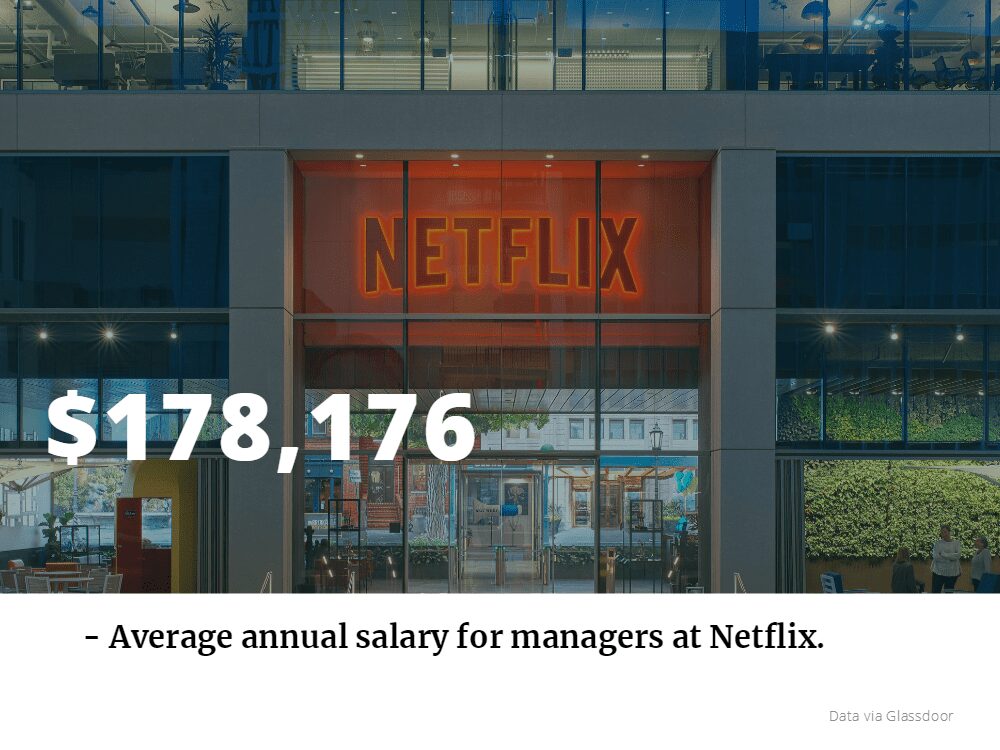
And there’s no doubt that hard work has paid off for the company. Since 2012, the Netflix stock has increased 2,500 percent and is the indisputable leader in the entertainment industry. It might be a fairly ruthless culture, but it’s working and producing results.
Netflix Careers
According to one former employee who posted an Indeed review in March 2019, “the benefits and the company itself were great: flexibility, values, inexpensive insurance, no dress code, etc.” And others agree.
When you work at Netflix you can expect half free lunches, an amazing kitchen with all kinds of snack and drinks, and fair PTO and sick days. However, you can also expect a demanding schedule that requires you to be on your game and getting the job done.
“Fast-paced, dynamic company, great exposure, and learnings. High impact and good [renumeration] and perks. Many peoples dream company to work for,” one anonymous former director wrote on Glassdoor
Getting Hired at Netflix
Don’t expect getting a job at Netflix to be a piece of cake. According to a 2016 Reddit AMA (Ask Me Anything) hosted by a purported Netflix employee, the interview process is long, involved, and designed to make sure your personality fits the company culture, and you’re technically capable.
According to the Reddit, you’ll talk to “eight or so people,” some of whom are from HR while others are from higher up in the department where you’re applying to. Typically, if even a single person doesn’t like you, you won’t get the job. You’ll even be flown out to headquarters for an all-day interview just to make sure you’re the right person for the job.
As for what Netflix looks for in its employees, they want you to demonstrate qualities that align with their values. This includes:
- Courage
- Humility
- Curiosity
- Passion
- Being open to providing and receiving feedback
- Scrappiness and grit
- Team player
- Inclusive and self-aware
For more insight, there’s a great Netflix podcast that is all about how the company hires, which you can watch here.
Current Netflix Careers
Generally, Netflix does not high new grads or interns. According to a thread on Quora, Netflix does not consider itself an entry-level company. If you’re an exceptionally skilled candidate or someone with a rare skill, the company may make an exception, but for the most part, the company is looking for employees that already have experience.
There are currently more than 450 job openings at Netflix in California, London, Singapore, Amsterdam, Tokyo, and other locations around the world. Those openings include jobs in:
- Business development
- Marketing and public relations
- Finance
- Data, analytics, and algorithms
- Design and product innovation
The best part of every job opportunity at Netflix is the “freedom to do whatever you think is necessary to move the business forward. The worst thing is that nobody will tell you how to spend your time or what exactly you should be working on (outside of setting larger goals for your role),” according to a LinkedIn Q&A
Top MBA Recruiters: S&P Global
In 1869, Henry Varnum Poor published an investor’s guide to the American railroad industry. As it approaches its 160th year, New York City‘s S&P Global, the company that bearing his name, is an elite firm that organizes an index fund for the stock market and provides important financial information to businesses around the world.
S&P Global is one of the largest financial analytics firms in the world, which means that many MBAs who aspire to roles as quants should read on.
Why MBAs Love S&P Global
For those familiar with the Wall Street Journal, S&P Global’s massive international presence in the financial market is hard to miss. MBAs who want to pursue international opportunities or return to their home countries can find many opportunities with S&P Global, operating 65 offices spread across six continents.
Given the prominent position in finance, S&P Global offers extremely competitive wages to its employees. According to Glassdoor, MBAs who begin their careers at S&P Global as associates can earn an average of $110,397, with an additional $15,000 in cash bonuses.
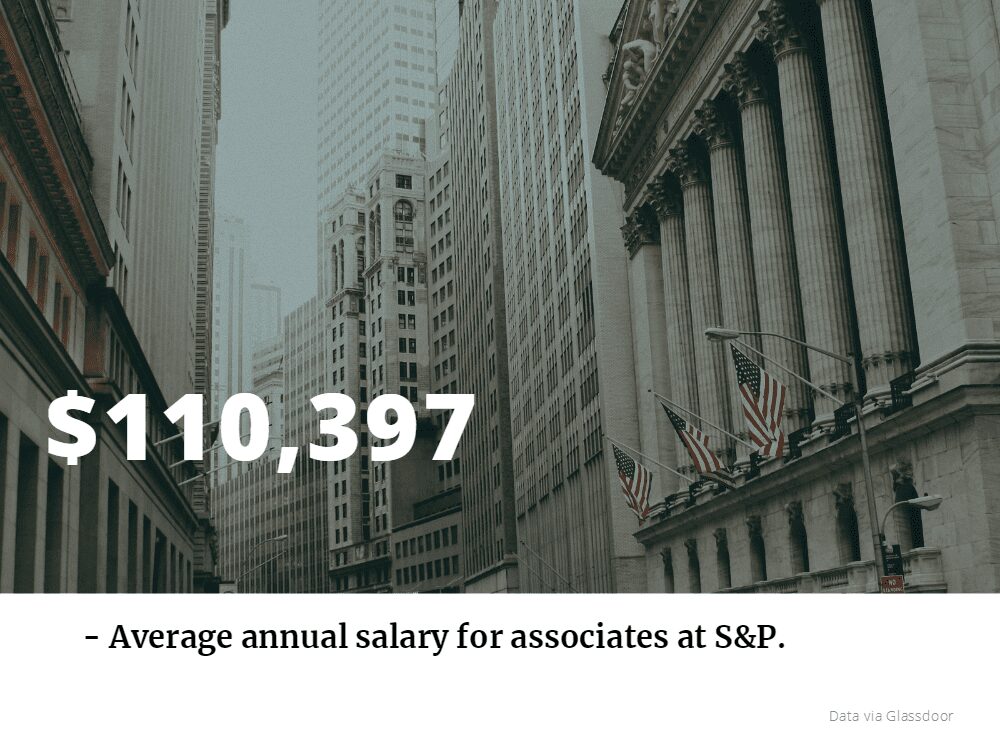
Life at S&P Global
S&P Global and S&P Global Market Intelligence both emphasize strong work-life balance and benefits. In addition to comprehensive health, vision, dental, and retirement benefits, S&P provides employees with support for child and elder care, adoption assistance, and a maternity management program for new mothers. S&P also offers employees a $5,000 refund for continuing education courses.
Another major benefit that employees extol is the high quality of their colleagues, who are described as extremely smart and open to collaboration. Some also mention how S&P Global is a fantastic place to learn about the business and get a foothold in the field.
Landing a Job at S&P Global
The firm operates on three primary principles: relevance, integrity, and excellence. S&P also seeks candidates who embody the following leadership qualities:
- Operate outside-in
- Elevate people
- Adopt a worldview
- Drive performance
- Speak the truth
- Execute with discipline.
It is critical that all prospective employees to understand what these values mean to them and how they can be applied to their work at S&P Global.
The application process is rather straightforward. For example, prospects for the associate position are first screened through a 30-minute phone interview. If the phone interview is passed, candidates are called in for a series of interviews and a two-hour in-house rating assessment, which requires that the candidate writes a one-page recommendation based on information provided to them by the firm.
As noted above, throughout this process, the firm attempts to assess the candidate’s fit within the S&P Global culture. S&P also looks to ensure that candidates have the technical skills necessary to thrive in the job if hired.
The best candidates will have made contact with current employees to review what systems are being used at S&P Global, particularly in their desired area of employment, and will know how their experience and mentality fits with the firm’s values and principles.
Current S&P Global Jobs Openings
The company is currently looking for a litany of MBA talent in and outside of the United States. There are over 300 openings at S&P Global Market Intelligence alone. Just last week, the following positions opened up:
Sales Associate – Investment Banking/Private Equity – New York City, U.S.
While this position does not explicitly require an MBA degree, the company notes that is preferred, in addition to “Investment Management, Hedge Fund, Private Equity and Investment Banking space.” Business school grads with a passion for sales are prime for this role, who will need to “identify key decision makers and influencers with target prospects and execute sales strategy collaborate with sales members, client services, product management, operations, technology, and legal to optimize product and service delivery.”
Product Manager – Digital Storefront – New York City, NY or Charlottesville, VA or Centennial, CO, U.S.
For business school grads less interested in the art of sales and more inclined to the world of strategy, a Product Manager role may be perfect. The role looks for people who can “build out a new digital storefront for all of our data sets products. You will work alongside S&P Global Technology, Commercial, Content and Operation teams to define executable business requirements that are aligned with Clients needs as well as the broader S&P Global strategy and goals.”
An MBA degree is not a requirement for the position. Rather, in line with the experience many MBAs have already earned by the time they earn a degree, the Product Manager should have at least three years of business analysis or project management experience, and four to six years of business experience in general.
Marketing Manager – New York City, U.S.
Business grads with at least five years of related experience may be very interested in the company’s Marketing Manager role in New York. They’re looking for candidates that can craft a compelling marketing narrative, working alongside the sales, research, and product teams, helping to build the brand.
5 Questions with the Senior Director of MBA Admissions at Maryland Smith
In our latest installment of the MetroMBA “5 Questions” series, we speak with Maria Pineda, the Senior Director of Admissions for the Full-Time MBA Program at the University of Maryland R.H. Smith School of Business. Pineda talks about the ideal MBA candidate, provides advice for getting accepted, and discusses unique opportunities at the school such as the Lead Fearlessly leadership development program.
1. What are you most excited about when it comes to the future of Maryland Smith?
“Smith is becoming a hub for designing the future. Business is becoming more competitive, more complex, more global, and more innovation-driven. Information, data, and technology are driving huge societal changes, often in ways that we can’t anticipate. We are preparing students to lead fearlessly, not just in today’s world, but in the world we can’t even imagine yet.
Smith MBAs learn how to turn data into insights, and insights into action. Our faculty bring their research into the classroom in ways that make even the most complex concepts relevant to managerial decision-making. The curriculum is designed to give students a strong foundation in analytical thinking and business fundamentals, and sharpen and hone leadership skills. With those skills, they’re ready to analyze problems, think creatively, innovate, and then lead a team to execute around a solution. As the economy keeps evolving, our students will be able to adapt.”
2. What does your ideal MBA candidate look like?
“First, we want self-starters, people who will take the initiative to pursue the many unique opportunities for learning and ‘transformation that come with a top MBA program. Our MBA students have a learning mindset. They are self-aware enough to “know what they don’t know’ and are adaptive, flexible and willing to work to grow their analytical skills and leadership competencies. We’re also looking for people who will actively contribute to our diverse, collaborative community, and seek out and consider viewpoints different from their own. We know that those traits—resourcefulness, a learning mindset, and an inclusive attitude—make fearless leaders.”
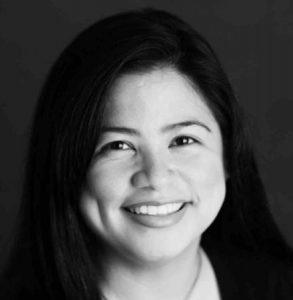
Maria Pineda, Senior Director of Admissions, Full-Time MBA Program
3. What is one thing a Maryland Smith MBA candidate can do for the best chance of getting accepted?
“Take control of your story. It all starts with self-reflection—know what your goals are and what you want to do with your MBA. Present yourself as if it was a job interview. Give us a good overview of your career accomplishments so far, and a thoughtful take on what you hope to accomplish in the future. Be authentic through the process, even as you’re bringing your best self to the table.
And get to know us! Connect with members of the admissions team and interact with current student ambassadors. That will help you see where your career goals align with our program’s distinctives.”
4. What parts of the MBA program should more students know about before starting their graduate school career?
“There are so many opportunities to develop your skills and leadership abilities beyond the classroom that you’ll need to curate your experiences. At Maryland Smith, those include opportunities like the Lead Fearlessly leadership development program, where students sharpen their leadership skills through out-of-the-box experiences like a yacht race on the Chesapeake Bay or small-group sessions with an executive coach. Or students can take on a challenge at the Datathon, part of the Smith Analytics Consortium’s annual conference, which brings together faculty and students with corporate partners. And there are case competitions, club leadership, consulting opportunities, and many more.”
5. Why do you love living and working in Maryland?
“Everyone knows about the many government agencies and NGOs headquartered in Washington DC, just seven miles from campus. But there are also many companies doing exciting work in biotech, defense, and cybersecurity. The job market is always fantastic (people say our local economy is recession-proof).
We have access to the culture, restaurants, and nightlife of a big city, with world-class attractions, a varied, high-quality performing arts scene and every pro sport you can name. We have beautiful outdoor spaces that are accessible from the hundreds of miles of biking and hiking trails around the region, whether you love the ocean or the mountains. And we have a really diverse mix of people that makes for a rich and interesting environment.”
School v. School: Arizona State v. USC
California or Arizona? Los Angeles or Phoenix? Arizona State University’s W.P. Carey School of Business of USC Marshall Business School?
It’s not so easy deciding where you should go to school for your MBA degree. There are many elements to consider including the location, cost of attendance, school rankings, post-graduation opportunities, and type of programs available. To help simplify the process for you, our School vs. School series takes a look at two similar top b-schools to compare and contrast what they offer.
Today, we’re taking a look at ASU vs. USC to see which is best for you. Continue reading…
1 Year MBA Programs
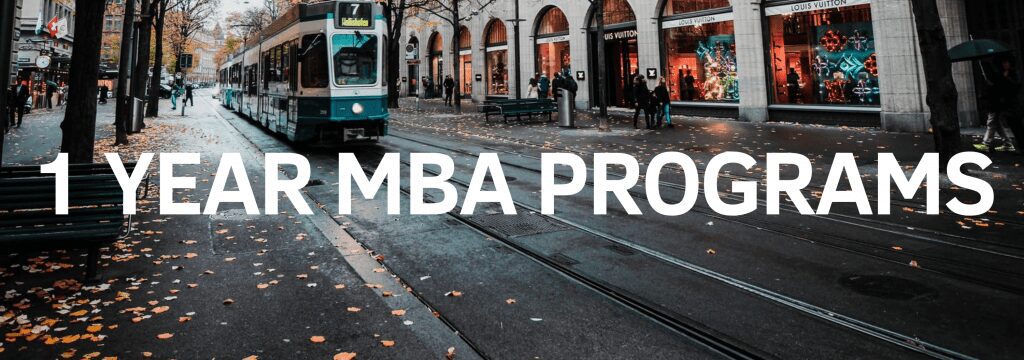
Welcome to MetroMBA’s 1 Year MBA Programs Guide. As the world’s best business schools continue to evolve, so does the MBA degree itself. Students at many of the world’s most prominent business schools now have more and more opportunities to earn the degree in just one year, or even less time. Below, we’ve outlined some of the best business schools in the world that offer these kinds of MBA programs. But what do you need to know before you apply?
What is a 1 Year MBA?
A traditional MBA program typically takes two years to complete. In addition, many business schools that offer a traditional MBA may offer a part-time MBA, specifically made for students who wish to earn the degree but have other professional obligations. These programs typically take around three years to complete but can last sometimes as long as six or seven years, per the student’s schedule. However, as the degree continues to evolve, the inverse one year option has become more readily available. For those looking to earn an MBA outside of the United States, a one year MBA may seem fairly typical. Many of the best non-U.S. schools have been offering an MBA that only takes one year to complete for some time now, such as the Saïd Business School at the University of Oxford. However, these kinds of offerings were usually absent from their American counterparts, until very recently.
Why Should I Take a 1 Year MBA?
Like earning an MBA itself, there is no one reason to enroll in a 1 Year MBA program. For many students, this simply means earning the degree in as fast a time as possible in order to advance their career. For others, the allure of completing a program outside of the United States may drive the decision-making process. There are different financial implications when enrolling in a one year program as well, considering the cost of living for those taking two-year programs on-campus may be more financially burdensome than one would hope. The overall costs of these kinds of MBA programs tend to be less than two-year MBAs, especially considering the cost of living. However, before one enrolls, the factor of time commitment must be fully considered.
Atlanta
Mercer University-The Eugene W. Stetson School of Business & Economics full-time MBA program at Mercer University can be completed in as little as 10-12 months.
Baltimore
The Salisbury University Perdue School of Business offers an accelerated one year Online MBA, that can be taken in a hybrid format of both online classes and in person. Loyola University Maryland In addition to the GMAT waiver offering, the full-time MBA at the Sellinger School of Business at the Loyola University Maryland can be completed in just one year.
Boston
The Babson College F.W. Olin Graduate School of Business offers a One Year MBA alongside its traditional MBA offerings. Students wishing to enroll in the program must have completed an undergraduate degree in business or economics, or have completed prerequisite business courses.
The executive MBA Sloan Fellows Program is a full-time, year long program.
The Sacred Heart University’s Jack Welch College of Business offers an MBA that can be taken either full-time or part-time, with the full-time option lasting just one year.
The Suffolk University -Sawyer Business School offers a full-time/part-time program can complete the program in as little as 10 months, depending upon how many courses that student is eligible to waive.
Chicago
The Dayton University School of Business Administration in Ohio offers a One Year Online MBA track for applicants that recently earned an undergraduate degree in business or a related field.
The Northwestern University Kellogg School of Management offers one of the most highly-rated one year MBA offerings in the world, with its Accelerated MBA (One-Year) MBA.
The Northern Illinois University College of Business offers a 12 Month MBA, with classes beginning every January.
The Notre Dame University Mendoza College of Business in Indiana offers one of the more highly-rated One Year MBA programs in entire U.S. Midwest.
The Liautaud Graduate School of Business at the University of Illinois at Chicago offers a 54-credit, 13.5 course Accelerated MBA option.
Dallas
The Baylor University Hankamer School of Business’ Online MBA program can be completed in as little as 12 months, or as long as 16 months.
The University of North Texas College of Business offers an Accelerated Online MBA program that can completed in just over one year (14 months).
The SMU Cox School of Business offers a Fast Track MBA program, which can be completed in just 12 months across three terms.
The Texas Christian University (TCU) Neeley School of Business offers six different kinds of MBA programs, including a 12-month Accelerated MBA.
Denver
The University of Colorado Denver Business School full-time MBA is actually an accelerated program and can be completed in just 11 months.
Houston
The University of Houston-Downtown Davies College of Business full-time MBA can be completed in just one year, depending upon the specialization selected by the student.
London
The Judge Business School at the University of Cambridge One-Year MBA features four eight-11 week terms.
The City University London Cass Business School full-time MBA is a 12-month program structured around “Block Learning.”
The Cranfield School of Management One-Year MBA is divided into four separate 10 week terms.
The entirely paperless Imperial College Business School full-time MBA can be completed in just 12 months.
The University of Oxford Saïd Business School One Year MBA is broken into four different terms, with a three-week orientation at the beginning.
The University of Reading Henley Business School full-time MBA is designed to be completed in just 12 months.
Los Angeles
USC’s IBEAR MBA (International Business Education and Research MBA) is a one-year, accelerated, full-time, international MBA program designed for mid-career professionals being groomed to assume senior global positions.
New York City
The Binghamton University School of Managment Fast-Track Professional MBA program takes just one year to complete, with students meeting on Saturdays and attend class from 8:30 a.m. to 5 p.m.
The Cornell Johnson One-Year MBA is a full-time program designed for students who have already earned a certification or are enrolled in one of the school’s dual degree programs. Certifications include: CFA, CPA, Institute of Chartered Financial Accountants (U.K. and India version of CPA), Society of Actuaries, and PMPs. The program begins in May and ends in May of the following year, including a 10-week orientation in the summer. The entire program takes place on the Cornell main campus in Ithaca, New York.
The 47-credit 1-MBA at the Lehigh University College of Business and Economics allows students to earn their MBA in just one year, while taking classes both in-person and online.
Philadelphia
The La Salle Business School full-time and One-Year MBA programs can both be completed in as little as 12 months. The length of time in the full-time program depends upon the specializations selected by the student.
The Saint Joseph’s University Haub School of Business One-Year Executive MBA (EMBA) is one of the few of its kind offered in Philadelphia, able to be completed in just one year.
The Graduate Director at the West Chester University Business School may offer a GMAT waiver for its Online MBA program, which may take only nine months to complete.
San Diego
The Point Loma Nazarene University Fermanian School of Business Daytime MBA was designed for recent college graduates, and also offers a GMAT waiver for potential applicants.
The University of San Diego School of Business Administration International MBA program, designed for students looking to understand the international world of business better, can be completed in just one year.
San Francisco
The Early Career MBA program is an accelerated offering, beginning every fall, with 2-3 courses per session with 6-8 weeks of courses per class.
The San Francisco State Fast Track MBA is designed to accommodate needs of both full-time students with afternoon and evening classes. Students in the program can complete their MBA in as little as 12 months.
Seattle
The Seattle University Albers School of Business and Economics Full-Time MBA (Bridge) is a daytime, cohort program, designed for students with little business experience (none required) that did not major in business for their undergraduate studies.
Toronto
The HEC Montréal full-time MBA features 54 credits of course work over a span of 12 months.
The Western University Canada Ivey Business School full-time MBA program can be completed in just 12 months, while the Accelerated MBA version can be completed in just eight months.
The 15-month McGill-HEC Montréal Executive MBA program, held at both the McGill University Desautelts Faculty of Management and HEC Montréal campuses, does not explicitly require GMAT/GRE scores in order to gain admission.
The Smith School of Business at Queen’s University full-time MBA and Accelerated MBA can each be completed in just 12 months. The accelerated variation, however, can be taken outside of the Queen’s University campus in the following metros: Vancouver; Calgary; Edmonton; Toronto; Mississauga; Markham; Ottawa; and Montreal. In addition, classes can also be taken online.
The Ryerson University Ted Rogers School of Management MBA In Management of Technology and Innovation features an accelerated offering that can be completed in just 12 months.
The Telfer School of Management MBA program features both a part-time and full-time format, with the full-time version taking 12 months to complete.
 Loading Programs
Loading Programs
 Sign up for our weekly newsletter to get the top business school news, advice, and more delivered to your inbox.
Sign up for our weekly newsletter to get the top business school news, advice, and more delivered to your inbox.
Top 5 Part-Time MBA Programs in the Midwest
Balancing a job and graduate school isn’t easy. You have to make a lot of sacrifices when it comes to how you spend your time. Hanging out with friends will be replaced with studying, and staying late at work or working on weekends will be replaced with heading to class. It’s a difficult path through the results should be well worth the effort if you choose a quality part-time MBA program.
For those living in the Midwest, choosing the right part-time MBA program is not easy. Many of the highest ranked part-time MBA programs (according to the U.S. News & World Report) call the Midwest home. So, what’s the best program for you and why?
We’re taking a look at the top five part-time MBA programs in the Midwest and telling you how they rank and why you should consider them. Continue reading…
Friday News Roundup – Fox Alum Promotes Financial Literacy, Haas Hosts Conference on African Business, and More
Let’s take a look at some of the biggest stories from this week, including Temple Fox promoting new financial literacy initiatives.
Fox Alumnus Offers Affordable Financial Literacy Programs to Philly’s Small Businesses – Fox School News
A Temple University Fox School of Business MBA alumnus has made it his goal to promote financial literacy through a new non-profit startup.
Thomas McDevitt, MBA ’02, formed Philly Financial Planning to offer underserved communities the tools to make informed financial decisions – tools which have not been available to these communities in the past. Philly Financial will seek to partner with various organizations to promote their cause and to implement programs.
McDevitt said, “Philanthropists, faith-based organizations, local government officials, community and neighborhood leaders, … corporations, learning institutions, and financial [institutions] can all play a meaningful role in helping us to achieve our long-term strategic goals of closing Philadelphia’s wealth gap”. In conjunction with Philly Financial, McDevitt hopes to form ‘The Eagle’s Nest’, a Shark Tank style competition series geared toward inner city entrepreneurs.
Education on financial matters has been McDevitt’s focus since his time at Fox. He formed McDevitt & Kline, LLC, with another Fox alum, Dr. Bill Kline, to offer continuing education to attorneys and CPAs.
Programs like his are necessary, because, as he says, “The financial literacy programs that exist in Philadelphia today are definitely not addressing the root causes of generational poverty.”
Africa Business Forum to Focus on Opportunity, Innovation in a Growing Economy – Haas Newsroom
The University of California, Berkeley Haas School of Business will host the 5th Annual Africa Business Forum, entitled “Africa on the Move: Enabling Homegrown Innovation,” on April 6, 2019.
The factors at work in Africa such as rapid growth and a youthful population make it appealing for existing companies and startups alike, as well as for investors.
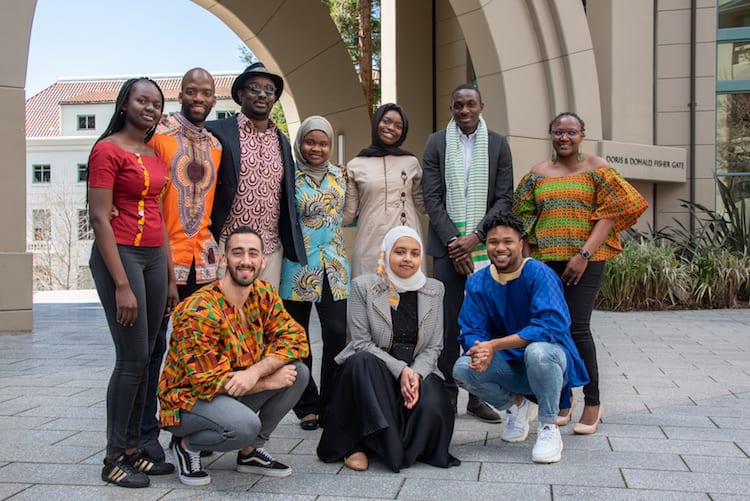
Cheikhou Diaw, MBA 19, co-chair of the event, says, “There are billions of opportunities[in Africa]. Making people aware of those opportunities is something I’ve been trying to do since I joined Haas … It’s really important for us to make sure that people in the Berkeley community and the Bay Area understand that Africa is more than a place with safaris or a place full of poverty and disease.”
Of utmost importance to the chairs of the conference was focusing upon ways in which policymakers and leaders of business can support the growth of economies in the most beneficial and responsible ways. The conference will be comprised of panel discussions, keynote talks, and a hackathon on public policy innovation. Among the forum’s guests will be Andile Ngcaba, founder and chairman of the investment group Convergence Partners; Benjamin Fernandes, founder of fintech company NALA; and Nichole Yembra, founder and managing director of The Chrysalis Company.
Rutgers MBA in Supply Chain Management Leads to Opportunities to Work in Canada – Insights & News
Rutgers University Business School and the Supply Chain Management Association (SCMA) have joined forces to grant MBAs assistance in receiving their Supply Chain Management Professional (SCMP) designation.
This partnership will benefit MBAs seeking opportunities in Canada, as the SCMP designation is frequently required by Canadian companies as they search for qualified supply chain professionals. Christian Buhagiar, President and CEO of SCMA, says:
“Rutgers is the first U.S. university with which we’ve partnered to develop advanced standing pathways into our SCMP designation. Immigration is a key economic driver for Canada, supported by the Government of Canada, and creating international pathways to Canada’s most sought-after supply chain designation will open opportunities for those wishing to emigrate to work in Canadian supply chain management.”
Under the agreement, MBAs from Rutgers’ program receive exemption from certain SCMA workshops and educational modules as they pursue a SCMP designation. Andy Gogates, Manager of Corporate Relations at Rutgers Business School, was a major player in forming the partnership. He says, “It’s a testament to the strength of Rutgers supply chain management curriculum to so closely match the requirements for the SCMP designation … This is a real advantage for Rutgers MBA graduates looking for career opportunities in Canada.”
Harvard Business School Joins Farm Forward’s Leadership Circle – Harvard Business School Newsroom
Harvard Business School recently joined the Leadership Circle of sustainable agriculture non-profit Farm Forward.
Farm Forward works to promote awareness and access to food options that support humane treatment of animals and responsible farming practices. HBS joins Villanova University, UC Berkeley, and 12 other organizations as an institutional partner.
Leadership Circle members, according to Farm Forward Executive Director Andrew DiCoriolis, “practice the kind of values-based food purchasing that all institutions should strive for. Through thoughtful procurement policies, institutions like Harvard Business School meet growing consumer demands for more ethical and sustainable food by decreasing their carbon footprint and improving the welfare of farmed animals.”
The relationship with Farm Forward is part of a growing effort by HBS to implement sustainable practices across campus. Its alignment with Farm Forward will result in procurement of food products that are from certified organizations, along with the introduction of more plant based foods on the menus of the campus’ dining halls. Both dining halls are certified by the Green Restaurant Association, and leftover food is donated to Food for Free, which donates to shelters or to others in need.
The University of Texas McCombs School of Business and Moody College of Communication Join Forces with Blue Cross Blue Shield of Texas – Newswire
The University of Texas McCombs School of Business and Moody College of Communication will partner with Blue Cross Blue Shield of Texas to conduct research on administration of adult vaccines in two Texas counties.
The $500,000 grant will help advance research on issues that result in the ever rising cost of healthcare. The study, “Improving Adult Vaccine Delivery by Optimizing Clinical and Health IT Processes in Austin/Travis County, Texas” will be led by Dr. Leanne Field, a clinical professor at the College of Natural Sciences and director for Digital Health Care Innovation at McCombs.
Dr. Vince Fonseca, a physician specializing in public health and community based medicine, will also be part of the team. He says, “Vaccines are some of the most cost-effective, high-value health services available, yet adult vaccine coverage is suboptimal in the United States.”
The research team hopes to implement their findings to improve access to vaccines and other interventions at a lower cost to the consumers who most need them.
The College Admissions Scandal—Could it Happen with MBA Programs?
Earlier this month, dozens of people—including celebrities Lori Laughlin, William H. Macy, Felicity Huffman, and Mossimo Giannulli—were caught greasing the wheels in a major college admissions scandal. Parents funneled a combined total of $25 million through a college admissions consultant, William “Rick” Singer, to athletic coaches and test proctors, all with the aim of gaining admission for their children to an elite undergrad program. Undergraduate programs entangled in the scandal included Stanford University, the University of Southern California, Wake Forest University, Georgetown University, Yale University and others.
Singer organized the bribery through his admissions consulting operation and a phony non-profit called Key Worldwide Foundation. In exchange for payment, the exam proctors would give students more time for the SATs and ACTs, provide answers and even allow substitute test takers. Meanwhile, athletic coaches would push candidates as recruits at their institution, whether or not they even had athletic experience.

Full House actress Lori Laughlin (left) was one of the major names caught in “Operation Varsity Blues,” paying an alleged $500,000 bribery to get her daughters Olivia Jade (center) and Isabella Rose (right) gain admission to USC / Photo via Gabriel Olsen/Getty Images
“Operation Varsity Blues,” as the FBI has nicknamed the investigation, exposed weaknesses in the college admissions process and demonstrated the shocking lengths that some parents will go to in securing a brand name education for their children.
We’ve seen the pressure and the hope of gaining admission to a top business school—so what’s to prevent fellow MBA applicants from gaming the system? Clear Admit believes there are several key differences in the MBA application space that make the “Operation Varsity Blues” type of scandal less likely.
- GMAC Runs a Tight Ship
The Graduate Management Admissions Council (GMAC) owns the GMAT exam, a test required by a majority of leading business schools for admission. The test is only offered via computer, making it harder to bribe a proctor for extra exam time. It also features strict identity security—including palm scanning—that thwarts any attempt of substitution of the test taker. Fraudulent attempts to increase GMAT scores have happened in the past, but GMAC has been swift in taking appropriate measures to avoid future threats to the integrity of the test. For instance, GMAC explicitly chose Pearson as the designated administer of the exam in 2006 due to the firm’s track record in testing security and anti-fraud measures. - Without Sports, There are No Coaches to Bribe
There are no formal athletic programs in graduate business programs. Unlike for the undergraduate scandal, the space for which one would pay simply does not exist. - Integrity Matters, and AIGAC Helps
The Association of International Graduate Admissions Consultants (AIGAC) released a statement upon news of the undergraduate admissions scandal: “AIGAC was established with the express purpose of setting high ethical standards in the graduate admissions consulting industry…AIGAC exists to provide support and professional development for those helping young people self-reflect through the admissions process and attain the right education in the right way.” Scott Shrum, former President and COO of Veritas Prep and current Secretary of AIGAC, added, “One of the most important things AIGAC does is keep the lines of communication open between the admissions consulting industry and administrators at schools. The more the admissions process seems murky to applicants, the more room that shady operators have to operate in the twilight and promise things that they really shouldn’t be promising. The more transparent the process is, the less room there is for that sort of behavior, and AIGAC has helped schools find allies in the industry who also want more transparency. A good admissions coach helps an applicant see the process more clearly and approach it with more confidence, and I credit AIGAC and the schools for helping to make that situation better over the past decade.” - Admissions Consultants Offer Advice On How to Put Your Best Foot Forward, Not Tips to Cheat the System
Shrum also notes, “The journalists who conflate legitimate coaching with this scandal are either deliberately doing it or are missing the point. That’s like saying that hiring a tennis coach and giving your kid steroids are both ways to help your child do better in a tournament, so they must not be very different. While this scandal has rightly shed more light on the college admissions game, Rick Singer and his cronies weren’t admissions counselors. They were crooks.” - Applicants are in the Driver’s Seat
Clear Admit co-founder, Graham Richmond, shared the following observation, “Helicopter parents are much more likely to be present in undergraduate admissions. By the time young people turn their attention to the MBA, they are usually the ones driving the process (and NOT their parents) and therefore, there is far less likelihood of fraud.” - Sooner or Later, the Truth Will Come Out
Shrum also offered this perspective, “I think it would be naive to think [such a scandal] can’t happen in MBA admissions. In the test prep space, the Scoretop scandal from 2008 showed the lengths that people will go to in an effort to boost their GMAT scores. On the admissions side, it’s inevitable that an applicant from a well-connected family, or whose boss is a huge donor to a school, has a leg up in the process. As long as universities value fundraising, I think this will always be the case. With all that said, however, it’s important to keep in mind that business school classes tend to be much smaller than undergraduate colleges, so it’s much tougher to ‘hide’ a mediocre applicant in a class. But it surely happens.”
While the system itself clearly has several safeguards against fraud, Shrum left us with a dose of reality:
“Unethical clients and unscrupulous admissions consultants find each other. It’s rare that an innocent family gets steered into bribery by an unethical consultant, or vice versa. They know what they’re up to, and what/whom to look for. I can’t count the number of times an applicant or parent has asked me, ‘So you’ll write the essays for us, right?’ and when I explain that’s not how it works, they move on. In some cases, I’m sure they find an admissions consultant who will do just that for them. Both parties know that what they’re doing is wrong, but they seem to have no problem doing it.”
The view at Clear Admit is that what happened in the “Operation Varsity Blues” case is clearly repugnant and unethical. It is also sad and a little puzzling.
Richmond offered the following thoughts: “On some level, this shouldn’t be shocking; it’s certainly not the first time we’ve seen people have ethical lapses when they can line their own pockets with money. But what sticks with me is the role that the parents played. These parents—who are presumably well educated and could have theoretically provided a great environment for their children to become smart young people and get into great schools on their own merit—felt the need to cheat. I wonder if they were perhaps too busy with their careers and not bothering to parent (resulting in kids who weren’t motivated enough) … or if they were somehow led to believe that this is how the college admissions game is played. Or perhaps it was just a case of them desperately wanting to be able to brag about the success of their children at cocktail parties? In all cases, it’s just profoundly sad.”
This article on the recent college admissions scandal has been edited and republished with permissions from its original source, Clear Admit.
School v. School: Michigan Ross v. Minnesota Carlson
Where should you go to school for your MBA? It’s a hard decision that has to factor in many different elements from location to reputation, alumni networks, ROI, and program options.
To help simplify the process for you, our School vs. School series takes a look at two similar top b-schools to compare and contrast their offerings. Today, we look at Michigan vs Minnesota to see which is best for you. Continue reading…
Columbia Professor Offers Advice on #MeToo Fallout for Female Leadership
The #MeToo movement has been a good thing, bringing to light many gender issues regarding sexual harassment and assault. And, it’s been particularly valuable for women in the workplace.
Unfortunately, while most of the response to the #MeToo movement has been positive, it has triggered a few unexpected negative consequences. As a Forbes article recently explains, there’s a “potential threat to women’s advancement to senior leadership, as some men have become wary of forging professional relationships with female colleagues.”
Men Are Worried About Harassment
Since the #MeToo falloout, 82 percent of men have admitted to being worried about false claims of harassment—more than any other gender issue in the workplace. Worse still, that fear has resulted in half of all male managers feeling uncomfortable mentoring, socializing, and working alone with women, revealed a LeanIn survey. Now, senior men are three times more likely to hesitate to ask a junior-level woman to a work dinner than a junior-level man.
Fixing the Problem
Unfortunately, these negative responses to #MeToo could slow the progress for female leadership, which is precisely the opposite reaction that the movement promoted. It’s also bad for organizations, as research shows that female executives increase profitability.
So, what can organizations do to ensure these adverse reactions to #MeToo don’t stop women from climbing the ladder? Here are three things that Columbia University professor Jason Wingard tells Forbes companies could do.
1. Improve Workplace Flexibility
According to Pew research, over half of millennial mothers (58 percent) admit that being a parent makes it harder to get ahead at work. Only 19 percent of fathers feel that way.
If you want more women in leadership, you have to improve workplace flexibility to accommodate families better. When there are stronger policies in place that allow women to meet the demands of the office and home, then more women will remain in the workforce. This includes offering extended maternity leave, childcare options, and flexible working arrangements.
2. Develop Sponsorship Programs
Your company can also help advance women in leadership by formalizing relationships between male leaders and female subordinates via sponsorships. Compared to mentorships, sponsorships are more official and advocated by senior leaders, which can remove some of the fear.
Best yet, sponsors are typically more satisfied in their career and women being sponsored are 68 percent satisfied with their career advancement. Furthermore, 85 percent of mothers with sponsors are more likely to continue working full time compared to just 58 percent without.
3. Make Clear Company Policies
Since #MeToo, 55 percent of American men feel that it’s more difficult to know how to interact with women at work. Companies that create more clarity in the workplace with clearly defined sexual harassment policies can help alleviate this concern. Organizations should also clearly define company policies regarding romantic relationships in the workplace.
No matter what your company decides to do in response to #MeToo, the key thing to remember is that action must be taken now. You cannot wait and allow negative reactions to the movement to harm women’s ability to reach leadership positions at your organization.
This article has been edited and republished with permissions from its original source, Clear Admit.
Top MBA Recruiters: Deutsche Bank
Deutsche Bank, the 15th-largest bank in the world, oversees $1.6 trillion in total assets, operates offices in 58 countries, and employs more than 91,000 employees. And, of course, that means a lot of Deutsche Bank career opportunities for MBA students and graduates.
Given its stellar reputation for international investment and strong position in the global financial market, Deutsche Bank has long been a desirable destination for MBA graduates. Although Deutsche Bank has not always been in the news for the most honorable reasons, right now is actually an excellent time for MBAs to join the company.
Rochester Simon STEM-Designated MBA Paves New Path
As international applications at U.S. business schools drop, there’s more demand than ever for science, technology, engineering, and math disciplines in MBA curriculum.
Why? The new STEM designation program.
Created by the federal government to help with the shortage of qualified workers in the STEM fields, the program makes H1b visas far more attractive. If a student attends a STEM-designated education program and gains a STEM job after graduation, they gain an additional 24 months of optional practical training (OPT) time. This lengthens their stay in the U.S. from one to three years, which is very attractive to candidates and a solid reason for schools to consider the STEM designation. And many have.
Top B-Schools Get STEM-Designated
Last year, Duke University’s Fuqua School of Business added a full-time MBA certificate in management science and technology management that was STEM designated. Two years ago, the University of Wisconsin School of Business achieved STEM designation for two MBA specializations: supply chain management and operations and technology management. The University of Massachusetts at Dartmouth also has a STEM designation for its Charlton MBA with a specialization in business analytics.
However, only one b-school has earned a STEM designation for its full-time MBA program no matter the specialization: the University of Rochester Simon Business School.
“We’re the most quantitative business school in the top 50, and that’s necessary to get this STEM certification,” says Dean Andrew Ainslie. “We’re in a unique position. We have an unusually high amount of math and technical curriculum. So, when we started looking at the percentage of our classes dedicated to STEM, it was obvious that we easily met the guidelines. A STEM-designated MBA just made sense for our students, and I don’t think anyone can follow us.”
How Simon Business School Achieved its STEM Designation
Moving to a STEM designation was reasonably easy for Simon Business School; it’s been built into the school’s DNA since the 1970s. Back then, the dean decided that the majority of the coursework should be focused on quantitative subjects—economics, statistics, and operations—and that’s held through until today.
“STEM designation is interesting; it’s all done internally. There are federal guidelines for what’s required, and we can be subject to audits, but we’re the ones responsible for overseeing our STEM-designated MBA program on campus,” says Ainslie.
This meant it was up to Rochester to take a look at their MBA curriculum and decide if they had the right percentage of math- and technology-based curriculum to fit the absolute minimum acceptable level. That level was, “at least 50 percent of the classes should have at least 50 percent STEM content. So 25 percent of all classes being STEM,” Ainslie explains. “We’re well above that.”
50 to 60 Percent STEM Curriculum
“We don’t have any faculty in soft areas such as HR or behavioral studies,” Ainslie explains. “That’s necessary to do this. All of our faculty voted positively on STEM designating in every area.” And while the school has started to add some curriculum in other areas—communications and experiential learning—around 50 to 60 percent of all their MBA content is STEM, far more than necessary to get the certification.
Even with variability in the second year when students can choose their electives, it was easy for Simon’s MBA program to achieve the STEM designation. “We are something of an unusual program in how analytics focused we are. Our branding is around analytics, and that shows,” says Ainslie.
And in cases where more STEM content was required, many of the faculty were happy to revise their curriculum to fit the designation better. One professor even decided to create an entirely new finance course that “uses R and Python programming to teach about finance through algorithms and coding,” Ainslie explains. “It’s a new course on technology and finance, and he wasn’t the only professor to do something like this.”
Simon Business School Meeting Recruiter and Student Needs Post STEM-Designated MBA
As for what’s happened at the school since achieving a STEM-designated MBA program, while it’s always tricky to tell what’s driving things, Ainslie believes things are going well. This year, MBA applications were up 7 percent, and while that might seem modest, it’s an increase that Simon Business School is quite happy about.
They’ve also recognized some changes in regards to recruiting and hiring. While they’re not changing who they go after or how, they are definitely making sure that all of their MBA candidates understand the advantage of STEM. “It’s not just the three years of a work visa, but business has become much more analytics-focused,” says Ainslie. “STEM skills are valuable in the marketplace. A STEM MBA is what companies are looking for.”
And that’s definitely true when it comes to Simon’s recruiters. Since their STEM designation, they’ve had many alumni and recruiters reach out to them about their STEM MBA and express their excitement.
“Technical skills are in high demand,” explains Ainslie. “But there are only 65,000 H1b visas every year and 2.3 million STEM jobs. The market is desperate to get those positions filled.” And Simon is in the perfect position to help.
You can learn more about Simon Business School’s new STEM MBA here.
This article has been edited and republished with permissions from its original source, Clear Admit.



















